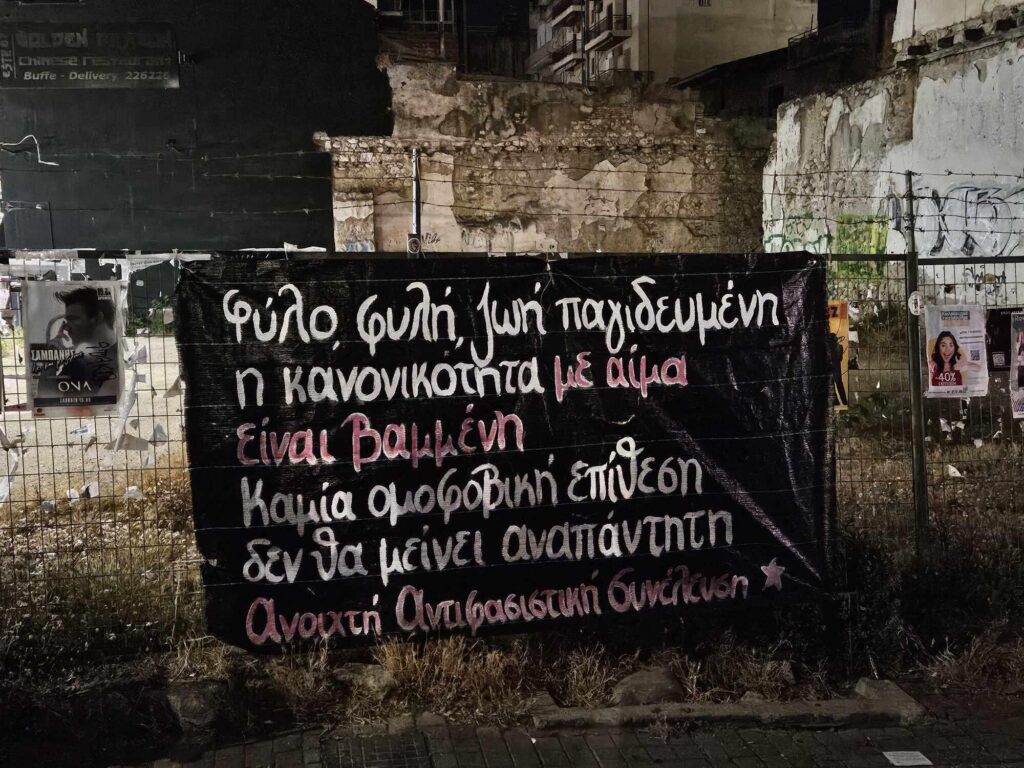Κείμενο που μοιράστηκε από μέλη της Ανοιχτής Αντιφασιστικής Συνέλευσης Πάτρας κατά την παρέμβασή μας στη λαϊκή αγορά της Αγυιάς το Σάββατο 11/10/2024
ΓΙΑ ΤΙΣ ΚΡΑΤΙΚΕΣ ΔΟΛΟΦΟΝΙΕΣ ΚΑΙ ΤΟΝ ΚΟΙΝΩΝΙΚΟ ΕΚΦΑΣΙΣΜΟ
Στον απόηχο της καπιταλιστικής κρίσης και των μνημονίων – τότε που για τη σωτηρία των τραπεζών χρησιμοποιήθηκαν πρακτικές αφαίμαξης της κοινωνικής βάσης – ο νεοφιλελευθερισμός συνεχίζει να ξηλώνει τις συλλογικές κατακτήσεις, προτάσσοντας τον ατομικισμό και ξεριζώνοντας τις κεκτημένες κοινωνικές αξίες που μέχρι πρότινος θεωρούνταν δεδομένες. Η αντιμετώπιση από πλευράς κράτους και κεφαλαίου της ανθρώπινης ζωής με όρους κόστους – κέρδους, έχει οδηγήσει σε μια σειρά επιθέσεων κατά της εργατικής τάξης αλλά και εις βάρος ευρύτερων καταπιεσμένων και εκμεταλλευόμενων κοινωνικών στρωμάτων. Η απαξίωση της ανθρώπινης ζωής καταδεικνύεται και από τις κρατικές/καπιταλιστικές δολοφονίες, όπως αυτές των 57 νεκρών στα Τέμπη, των τουλάχιστον 550 νεκρών μεταναστ(ρι)ών στο ναυάγιο της Πύλου, των αμέτρητων δολοφονημένων στα σύνορα, των αντιεργατικών νομοσχεδίων που οδηγούν σε καθημερινά θανατηφόρα εργατικά ‘’ατυχήματα’’, των χιλιάδων νεκρών από την περίοδο της πανδημίας που συνεχώς αυξάνονται λόγω της υποβάθμισης της δημόσιας υγειονομικής περίθαλψης, την επίσης υποβάθμιση της δημόσιας εκπαίδευσης αλλά και των ρατσιστικών και ομοφοβικών δολοφονιών.
Πέρα από αυτό, γίνεται αντιληπτό πως οι φασιστικές ρητορικές, οι οποίες κατά την διάρκεια των μνημονίων εκφράζονταν κυρίως από συγκεκριμένες φασιστικές ομάδες, όπως η Χ.Α., πλέον διαχέονται σε ολόκληρη την κοινωνία από κυβερνητικούς εκπρόσωπους και θεσμούς που προωθούν μια απολυταρχική και «αντιανθρωπιστική» αντίληψη. Οι ρητορικές αυτές διεισδύουν στον κοινωνικό ιστό μέσω θεσμικών οδών, ενισχύοντας και κανονικοποιώντας την ηθική και αξιακή κατάπτωση της σημερινής πραγματικότητας. Σε μία τέτοια συνθήκη, οι μπάτσοι-λιμενικοί πρωτοστατούν στις ρατσιστικές δολοφονίες, αφού αποτελούν τα εκτελεστικά τσιράκια του κράτους. Στις 21 Σεπτεμβρίου βασανίζεται και δολοφονείται βάναυσα ο μετανάστης Μοχάμεντ Καμράν Ασίκ στο ΑΤ Αγίου Παντελεήμονα. Ένα περιστατικό κρατικής ρατσιστικής βίας που έρχεται να προστεθεί στην μακριά λίστα των ρατσιστικών δολοφονιών της ΕΛΑΣ – ενός σώματος βαθύτατα εμβαπτισμένου σε φασιστικές ρητορικές και συνδεδεμένου με περιστατικά βασανισμών, βιασμών και άλλων δολοφονιών, μέχρι και με κυκλώματα trafficking και διακίνησης ναρκωτικών. Άλλωστε, η αντιμετώπιση των μεταναστ(ρι)ών από το ελληνικό κράτος είναι δομικά ρατσιστική και έχει διττή φύση. Από τη μια, το μεταναστευτικό υποκείμενο αντιμετωπίζεται ως φτηνό εργατικό δυναμικό για την εγχώρια παραγωγή – που πρέπει όμως να παραμένει υποβαθμισμένο (χωρίς χαρτιά, πολιτογράφηση κλπ) άρα και «οικονομικά προσιτό». Από την άλλη, προβάλλεται ως ο ‘’εξωτερικός εχθρός’’ του έθνους, τονώνοντας την εθνική ενότητα και αποπροσανατολίζοντας τους από τα κάτω της κοινωνίας από την ταξική πάλη και την εκμετάλλευση που οι ίδιοι υφίστανται από το κράτος και τον καπιταλισμό. Χαρακτηριστικό παράδειγμα αποτελεί η πολιτική της Ε.Ε. για τις μεταναστευτικές ροές, μια πολιτική που ανοιχτά προωθεί τα δολοφονικά στρατόπεδα συγκέντρωσης και τα pushbacks, ενώ παράλληλα, όταν υπάρχει έλλειψη φτηνού εργατικού δυναμικού, παραχωρεί στους/στις μετανάστριες/ες άδειες εργασίας.
Ακόμα περισσότερο, η τάση του ελληνικού κράτους προς ένα ολοκληρωτικό μοντέλο διαχείρισης, υποκινεί και συγκαλύπτει ρατσιστικά εγκλήματα, όπως οι δολοφονίες διάφορων φτωχοδιαβόλων στα ΑΤ. Αυτό το ολοκληρωτικό κρατικό μοντέλο διαχείρισης έχει οδηγήσει σε ένα κράτος και μια οικονομία – ρυθμιστή των πάντων. Τα πρόσφατα παραδείγματα των κρατικών και καπιταλιστικών εγκλημάτων, των Τεμπών, της Πύλου, της διαχείρισης της πανδημίας, της διάλυσης της δημόσιας υγειονομική περίθαλψης, των εργατικών ατυχημάτων- δολοφονιών και των χιλιάδων παρακολουθήσεων, έχουν δημιουργήσει μια νέα πραγματικότητα, μέσα στην οποία η συνεχής υπονόμευση της ανθρώπινης ζωής αποτελεί τη μόνη σταθερά.
Επιπροσθέτως, ο επιβαλλόμενος ταξικός χαρακτήρας της πραγματικότητας αυτής οδηγεί στην πλήρη απαξίωση των χαμηλότερων κοινωνικών στρωμάτων. Η κοινωνική βάση αδυνατεί να εξασφαλίσει τα αναγκαία είδη πρώτης ανάγκης λόγω ακρίβειας, δυσκολεύεται να καλύψει τα απαραίτητα ιατρικά έξοδα λόγω της κατάρρευσης του ΕΣΥ, να εισαχθεί στα δημόσια και “δωρεάν” πανεπιστήμια λόγω των ταξικών φραγμών, με αποτέλεσμα οι από τα κάτω να βρίσκονται υπό των ορίων της αξιοπρεπούς διαβίωσης. Οπότε, σε ένα σύστημα διακυβέρνησης και οργάνωσης της κοινωνίας, στο οποίο βιώνουμε την ολοκληρωτική επίθεση του κράτους και του κεφαλαίου, ο αντιανθρωπιστικός χαρακτήρας είναι κυρίαρχος, ενώ οι ζωές των φτωχών αξίζουν λιγότερο. Αυτή η διαρκής βαρβαρότητα του καπιταλισμού, ο οποίος συμπεριλαμβάνει και το κράτος ως βασικό ρυθμιστή της κίνησης του κεφαλαίου και ως διαμεσολαβητή στις ανθρώπινες σχέσεις, δεν μπορεί να θεωρηθεί τυχαία. Η «οικονομίστικη»/«κεφαλαιοκρατική» προσέγγιση της πραγματικότητας (δηλαδή με κριτήριο το κόστος – κέρδος) οδηγεί αναπόφευκτα σε μια βαθιά υποβάθμιση της αξίας της ανθρώπινης ζωής, αλλά και της ζωής εν γένει (λόγου χάρη η λεηλασία της φύσης και του περιβάλλοντος από το κεφάλαιο). Δεν πρόκειται για μια απλή αξιακή κρίση, αλλά για ένα δομικό ξεριζωμό των κεκτημένων και δεδομένων αξιών. Για παράδειγμα, οι ζωές των κρατουμένων, και κατά συνέπεια η αξία της ανθρώπινης ζωής, ευτελίζονται μέσω των απάνθρωπων συνθηκών κράτησης και των ρατσιστικών επιθέσεων. Η “αυτοκτονία” του 29χρονου από το Μπαγκλαντές μέσα στο Α.Τ Ομόνοιας στη 1 Οκτώβρη 24, δέκα μέρες μετά την δολοφονία του Μοχάμεντ Καμράν Ασίκ, επιβεβαιώνει δυστυχώς αυτή την συνθήκη.
Ταυτόχρονα, το κράτος από τη μεριά του, προσπαθεί να διατηρεί την ομαλή ροή του κεφαλαίου διαμέσου της εθνικής ενότητας και του εκφασισμού πλατιών κοινωνιών στρωμάτων. Δεν είναι εξάλλου λίγες οι φορές στη διάρκεια της παγκόσμιας ιστορίας, όπου υπήρξαν απολυταρχικά, δικτατορικά, ναζιστικά και φασιστικά κράτη, ο εθνικιστικός χαρακτήρας των οποίων ικανοποιούσε τις ανάγκες του κεφαλαίου, ενώ απέστρεφε την κοινή γνώμη από τους πραγματικούς δυνάστες της – το κράτος και το κεφάλαιο. Στα κράτη του σήμερα, οι κοινωνικές αντιστάσεις εξαλείφονται με την κρατική καταστολή να οργιάζει (με την ποινικοποίηση απεργιών, τις μεθοδεύσεις και τα φουσκωμένα κατηγορητήρια στις πολιτικές διώξεις κλπ). Η κοινωνία απογυμνώνεται από την συλλογική και ταξική συνείδηση και ο νεοφιλελευθερισμός έχει δημιουργήσει τις κατάλληλες προϋποθέσεις επέλασης του κεφαλαίου κι την επιβολή σιγής νεκροταφείου στην κοινωνία. Η απειλή μιας ολοκληρωτικά φασιστικής οργάνωσης τόσο του κράτους όσο και της κοινωνίας δεν είναι τόσο άμεση – αν και πάντα θα παραμονεύει, καθώς ο φασισμός ιστορικά εξασφαλίζει την ομαλή λειτουργία του καπιταλισμού σε συνθήκες δομικής καπιταλιστικής κρίσης, όταν το κράτος και τα αφεντικά νιώθουν πως η εξουσία ενδέχεται να ξεγλιστρήσει από τα χέρια τους. Ως αποτέλεσμα, η κοινωνία φασιστικοποιείται, όταν δεν υπάρχουν συλλογικές αντιστάσεις στην καπιταλιστική βαρβαρότητα. Οι κανιβαλικές συμπεριφορές που αναδύονται καθημερινά, επιβεβαιώνουν πως πολλοί και πολλές θα πατήσουν επί πτωμάτων, για να διασφαλίσουν την επιβίωσή τους. Μέσα σ’ αυτόν τον αλληλοφαγωμό, οι λακέδες και τα τσιράκια του κράτους μέσω των ΜΜΕ εκφράζουν ρητορικές μίσους, κανονικοποιώντας την πραγματικότητα αυτή ελέγχοντας τις κοινωνικές αντιδράσεις. Οι συνεχείς επιθέσεις σε άτομα ΛΟΑΤΚΙ, σε θηλυκότητες, σε μετανάστ(ρι)ες και πληθυσμιακές μειονότητες (πχ Ρομά) και σε κοινωνικούς(-ες) αγωνιστ(ρι)ές επιβεβαιώνουν την κανονικοποίηση της βίας και του θανάτου. Συνεπώς, είναι εμφανής η παρείσφρηση και η άνωθεν επιβολή των κανιβαλικών ρητορικών στον κοινωνικό ιστό, με τους τρόπους εκδήλωσης της βιαιότητας στις παιδικές και εφηβικές ηλικίες να αποτελούν επίσης δείκτη της αξιακής και κοινωνικής κρίσης στην παρούσα συγκυρία.
Αναδεικνύεται, λοιπόν, ότι ο φασισμός έχει πολλά και διαφορετικά προσωπεία. Ένα από αυτά που ριζώνει στην κοινωνία είναι αυτό του κοινωνικού εκφασισμού και συνιστά έναν βασικό πυλώνα επίθεσης στους από τα κάτω από το κράτος και το κεφάλαιο. Είναι μια επίθεση που στοχεύει στην εξάλειψη τόσο της συλλογικής και ταξικής συνείδησης όσο και εναντίον εκείνης της κουλτούρας αποδοχής της διαφορετικότητας, ενάντια στους ανθρώπους που αγωνίζονται για μια άλλη κοινωνία ελευθερίας, αλληλεγγύης και ισότητας, χωρίς κράτη, εξουσίες, καταπιεστές και καταπιεζόμενους. Είναι η κανονικοποίηση της απαξίωσης της ζωής προς μια νέα κοινωνική πραγματικότητα, όπου ρυθμιστής των πάντων είναι ο καπιταλισμός και το εκάστοτε κράτος με κριτήρια ποιος παράγει, ποιος καταναλώνει, ποιος περισσεύει και ποιος αποτελεί εμπόδιο στη γενικευμένη επίθεση εναντίον της ζωή μας. Πρόκειται, δηλαδή, για μια μετατόπιση του κράτους στον ολοκληρωτισμό.
Κόντρα σε αυτή τη δυστοπική πραγματικότητα που μας επιβάλλεται, ο αντιφασιστικός αγώνας οφείλει να αποτελεί ένα μεγάλο ανάχωμα. Και αυτό, γιατί ο φασισμός διοχετεύεται κάθετα στην κοινωνία από την κυρίαρχη τάξη του κράτους και του κεφαλαίου, διαπερνώντας και μολύνοντας όλα τα κοινωνικά στρώματα. Ο αντιφασιστικός αγώνας οφείλει να εκμηδενίσει το φασιστικό λόγο και τις αντίστοιχες ρητορικές και πρακτικές με μαχητικούς όρους, μην επιτρέποντας καμία δυνατότητα κοινωνικής διείσδυσης στους φασίστες. Παράλληλα, οφείλει να δημιουργήσει και μια πλατιά κοινωνική βάση, όπου τα αντιφασιστικά ιδανικά θα είναι ζωντανά. Χρειάζεται ένας πλατύς κοινωνικός αγώνας με σταθερή και στοχευμένη παρέμβαση σε κάθε πόλη, γειτονιά, χώρο εργασίας, σχολείο, μιας και ο κοινωνικός εκφασισμός μπορεί να εμφανιστεί σε κάθε έναν από τους προαναφερθέντες χώρους. Ακόμη, ο αντιφασιστικός αγώνας θα πρέπει να είναι ένας αγώνας ενάντια στο κράτος, τον καπιταλισμο, την πατριαρχία και τον κόσμο της εξουσίας. Ενάντια στην ανάθεση και οποιαδήποτε ρητορική και πρακτική καταπίεσης, αποκλεισμού και εκμετάλλευσης. Γιατί ο αντιφασισμός είναι αγώνας για μια κοινωνία ισότιμη, ελεύθερη και αλληλέγγυα.
ΕΝΑΝΤΙΑ ΣΤΟΝ (ΠΑΡΑ)ΚΡΑΤΙΚΟ ΦΑΣΙΣΜΟ, ΤΟΝ ΚΟΙΝΩΝΙΚΟ ΕΚΦΑΣΙΣΜΟ
& ΤΟ ΣΥΓΧΡΟΝΟ ΟΛΟΚΛΗΡΩΤΙΣΜΟ ΚΡΑΤΟΥΣ & ΚΕΦΑΛΑΙΟΥ
ΣΥΛΛΟΓΙΚΟΣ ΑΓΩΝΑΣ ΓΙΑ ΕΝΑΝ ΚΟΣΜΟ ΕΛΕΥΘΕΡΟ, ΙΣΟΤΙΜΟ & ΑΛΛΗΛΕΓΓΥΟ
Ανοιχτή Αντιφασιστική Συνέλευση Πάτρας | asp2023@espiv.net
Συνέλευση του εγχειρήματος κάθε Παρασκευή, στις 19:00, στην κατάληψη Παραρτήματος


